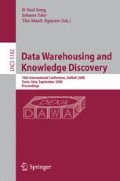Abstract
In privacy-preserving data mining, there is a need to consider on-line data collection applications in a client-server-to-user (CS2U) model, in which a trusted server can help clients create and disseminate anonymous data. Existing privacy-preserving data publishing (PPDP) and privacy-preserving data collection (PPDC) methods do not sufficiently address the needs of these applications. In this paper, we present a novel PPDC method that lets respondents (clients) use generalization to create anonymous data in the CS2U model. Generalization is widely used for PPDP but has not been used for PPDC. We propose a new probabilistic privacy measure to model a distribution attack and use it to define the respondent’s problem (RP) for finding an optimal anonymous tuple. We show that RP is NP-hard and present a heuristic algorithm for it. Our method is compared with a number of existing PPDC and PPDP methods in experiments based on two UCI datasets and two utility measures. Preliminary results show that our method can better protect against the distribution attack and provide good balance between privacy and data utility.
Access this chapter
Tax calculation will be finalised at checkout
Purchases are for personal use only
Preview
Unable to display preview. Download preview PDF.
References
Cranor, L. (ed.): Communication of ACM. Special Issue on Internet Privacy vol. 42(2) (1999)
Agrawal, R., Srikant, R.: Privacy-preserving data mining. In: ACM SIGMOD International Conference on Management of Data, pp. 439–450. ACM, New York (2000)
Evfimievski, A., Gehrke, J., Srikant, R.: Limiting privacy breaching in privacy preserving data mining. In: ACM Symposium on Principles of Database Systems, pp. 211–222. ACM, New York (2003)
Samarati, P., Sweeney, L.: Protecting privacy when disclosing information:k-anonymity and its enforcement through generalization and suppression. In: Proc. of the IEEE Symposium on Research in Security and Privacy (1998)
Aggarwal, C.C.: On k-anonymity and the curse of dimensionality. In: International Conference on Very Large Data Bases, pp. 901–909 (2005)
Yang, Z., Zhong, S., Wright, R.N.: Anonymity-preserving data collection. In: International Conference on Knowledge Discovery and Data Mining, pp. 334–343 (2005)
Machanavajjhala, A., Gehrke, J., Kifer, D., Venkitasubramaniam, M.: ℓ-diversity: Privacy beyond k-anonymity. In: IEEE International Conference on Data Engineering (2006)
Li, N., Li, T.: t-closeness: Privacy beyond k-anonymity and l-diversity. In: IEEE International Conference on Data Engineering (2007)
LeFevre, K., DeWitt, D.J., Ramakrishnan, R.: Mondrian multidimensional k-anonymity. In: IEEE International Conference on Data Engineering (2006)
LeFevre, K., DeWitt, D.J., Ramakrishnan, R.: Incognito: Efficient fulldomain k-anonymity. In: ACM SIGMOD International Conference on Management of Data (2005)
Ghinita, G., Karras, P., Kalnis, P., Mamoulis, N.: Fast data anonymization with low information loss. In: International Conference on Very Large Data Bases, pp. 758–769 (2007)
Warner, S.L.: Randomized response: A survey technique for eliminating evasive answer bias. Journal of American Statistical Association 57, 622–627 (1965)
Du, W., Zhan, Z.: Using randomized response techniques for privacy-preserving data mining. In: International Conference on Knowledge Discovery and Data Mining (2003)
Zhang, N., Wang, S., Zhao, W.: A new scheme on privacy-preserving data classification. In: International Conference on Knowledge Discovery and Data Mining, pp. 374–382 (2005)
Huang, Z., Du, W., Chen, B.: Deriving private informaiton from randomized data. In: ACM SIGMOD International Conference on Management of Data, pp. 37–47 (2005)
Du, Y., Xia, T., Tao, Y., Zhang, D., Zhu, F.: On multidimensional k-anonymity with local recoding generalization. In: IEEE International Conference on Data Engineering (2007)
The uci machine learning repository, http://mlearn.ics.uci.edu/MLRepository.html
Han, J., Kamber, M.: Data Mining Concepts and Techniques. Elsevier, Amsterdam (2006)
Author information
Authors and Affiliations
Editor information
Rights and permissions
Copyright information
© 2008 Springer-Verlag Berlin Heidelberg
About this paper
Cite this paper
Zhang, L., Zhang, W. (2008). Generalization-Based Privacy-Preserving Data Collection. In: Song, IY., Eder, J., Nguyen, T.M. (eds) Data Warehousing and Knowledge Discovery. DaWaK 2008. Lecture Notes in Computer Science, vol 5182. Springer, Berlin, Heidelberg. https://doi.org/10.1007/978-3-540-85836-2_11
Download citation
DOI: https://doi.org/10.1007/978-3-540-85836-2_11
Publisher Name: Springer, Berlin, Heidelberg
Print ISBN: 978-3-540-85835-5
Online ISBN: 978-3-540-85836-2
eBook Packages: Computer ScienceComputer Science (R0)

